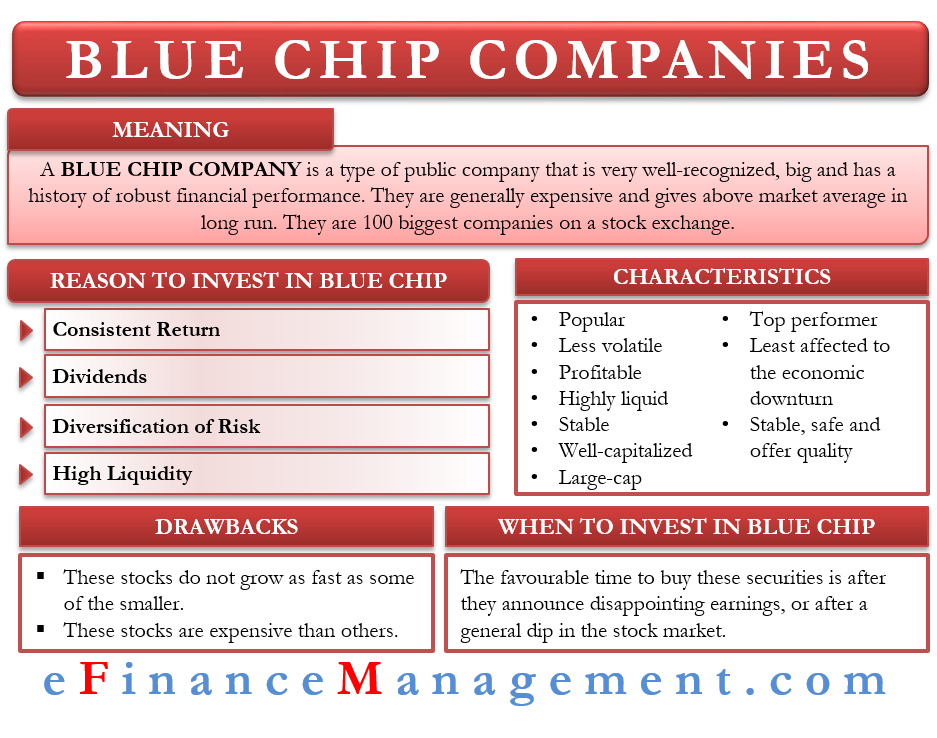A Blue chip company is a type of public company that is very well-recognized, big, and has a history of robust financial performance. We also call them blue-chip stock. They are known to survive tough market conditions and usually give above-average market returns in the long run.
Another characteristic of blue-chip stocks is that they are expensive as they usually are the market leader in their respective industry. The blue-chip stocks are the 100 biggest companies on a stock exchange. A few examples of blue-chip stocks are Apple, Disney, Intel, and more.
Blue Chip Index is the parameter available at all major stock exchanges, through which the performance of blue-chip companies could be tracked. The performance of such indexes also serves as a performance indicator of an industry or the economy.
Characteristics of A Blue Chip Company
Following are the primary characteristics of a blue-chip company or stock. In essence, they are popular, less volatile, profitable, highly liquid, have robust fundamentals, are well-capitalized, large-cap, amongst the top performer in the industry they operate in, relatively least affected by the economic downturn, stable, safe, and offer quality products and services.
All popular market indexes, such as the Nasdaq-100, the Dow Jones Industrial Average, and more, have blue-chip stocks as their main component. However, how big a company needs to be before it gets a tag of a blue-chip company is a matter of debate. However, a general benchmark is a market capitalization of $5 billion or more.
History
Oliver Gingold coined the term blue chip in 1923. Gingold, who was working for Dow Jones, noticed one day that many stocks were trading at $200 or more. He wrote an article on them using the term blue chip. Then the term was born and got famous. Initially, the name was used to denote highly-priced stocks but is now used when referring to high-quality stocks.
Many also believe that the blue betting disks inspire the term blue chip in the poker game. In the game, the blue discs are the most valuable.
Why Invest in Blue Chip Company?
There are several reasons to invest in a blue-chip stock. These are:
Consistent Returns
Such companies are popular household names with several years of existence. They enjoy consistent earnings and have a capable management team and great fundamentals. Such factors make them an excellent addition to anyone’s portfolio.
Also Read: Blue Sky Laws
Dividends
Most blue-chip companies are consistent dividend payers. This dividend payment is an extra income for the investors over their investment.

Diversification of Risk
An investment in a blue-chip stock is generally a low-risk investment. If an investor has a blue-chip share in his portfolio, it helps lower the overall risk of the portfolio. Also, such stocks don’t fall as sharply as others during adverse market conditions.
High Liquidity
Since such stocks are always in demand from individual and institutional investors, these stocks are highly liquid. This means an investor can quickly sell these stocks if they need money, as buyers are always there for such shares.
Drawbacks of a Blue Chip Stock
Following are the drawbacks of investing in a blue-chip company:
- Usually, these stocks do not grow as fast as some of the smaller, fast-growing firms. However, these smaller firms may be more risky and volatile.
- Another drawback is that these stocks are more expensive than the other shares. Thus, they are out of reach of many investors.
When to Invest in a Blue Chip Stock?
One can easily purchase a blue-chip stock through a broker or online. The favorable time to buy these securities is after they announce disappointing earnings or after a general dip in the stock market. Since these companies usually have robust fundamentals, they are likely to bounce back fast.
Also, try to find if any of the blue-chip stock is undervalued. Several metrics are available to check if a stock is undervalued or not, such as DCF valuation, dividing the net assets by outstanding shares, and more. However, you should avoid the blue-chip stocks that carry substantial long-term debt on their balance sheet.
Are They Always Safe?
Jeremy Siegel, in his book Stocks for the Long Run (1996), noted that blue-chip stocks are possibly the top investment option. For this study, Siegel made use of the financial data from 1802 to conclude that investing in blue-chip stocks is better than investing in gold, bonds, or Treasury bills.
Goldman Sachs’ John Campbell also had a similar view in 1998. At that time, Campbell had a list of blue-chip stocks that gave a return of over 36% annually for three years, compared to a gain of 30.2% for the S&P 500.
A blue-chip company may have survived several downturns and offer more returns, but it is no guarantee that it will remain safe forever. During the 2008 recession, many blue-chip companies went bankrupt, such as Lehman Brothers and several major European banks. It proves that even the best companies may struggle during extreme adverse conditions.
So, even though investing in a blue-chip stock is suitable for the portfolio, a portfolio must not only consist of blue-chip shares. Instead, it should have a mix of bonds, cash, blue-chip stocks, other stocks, and other financial instruments.
Final Words
A blue-chip company or a blue-chip stock is a must for investors, especially beginners who don’t want to take too much risk. Even for experienced investors, having blue-chip shares boosts the overall value of their portfolio. They may not give an above-average return in the short term, but they are a long-term investment.

